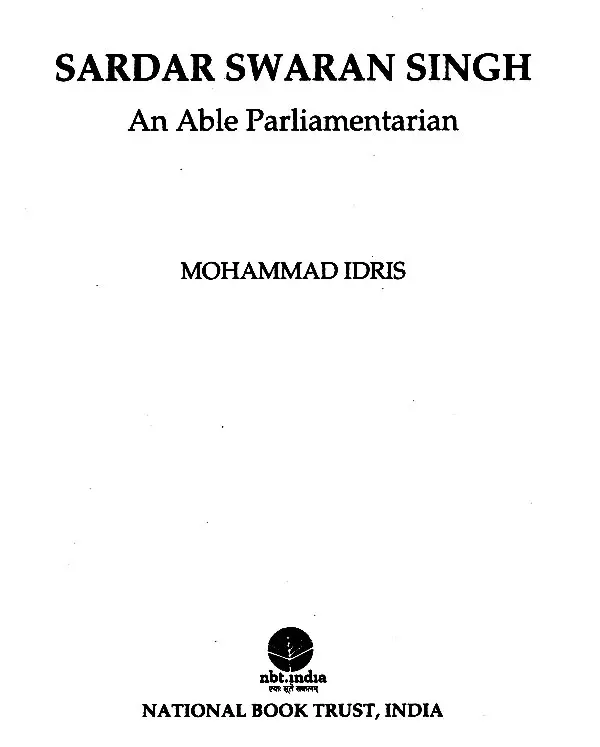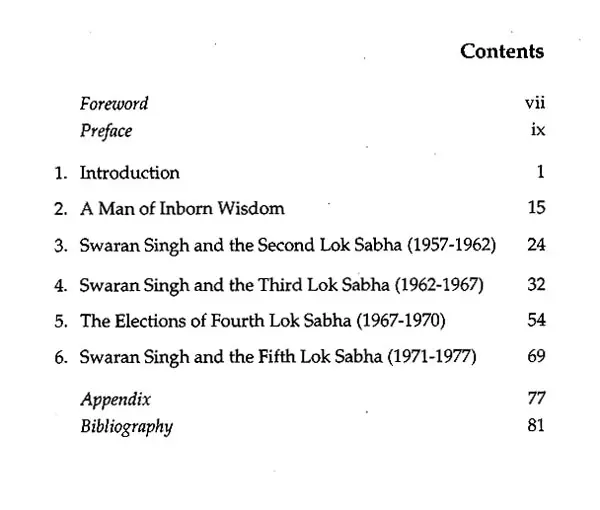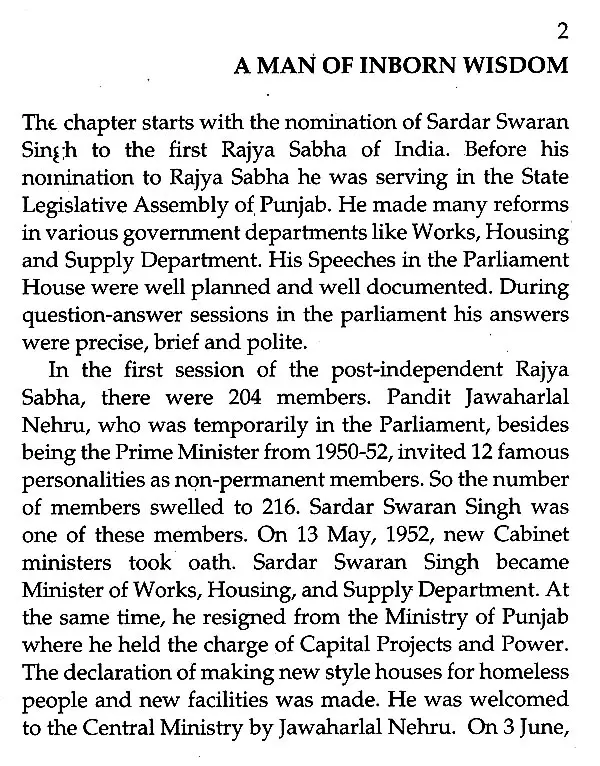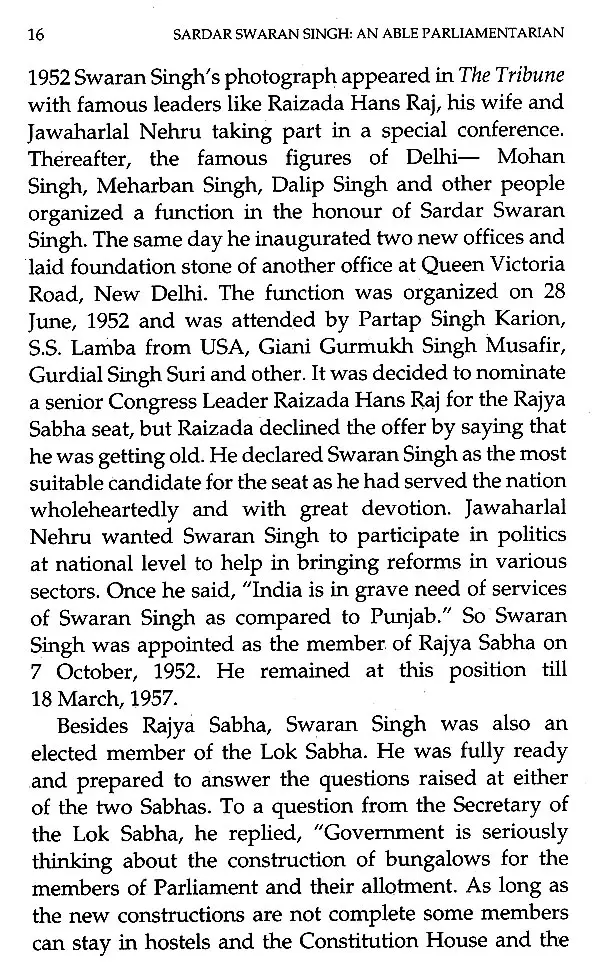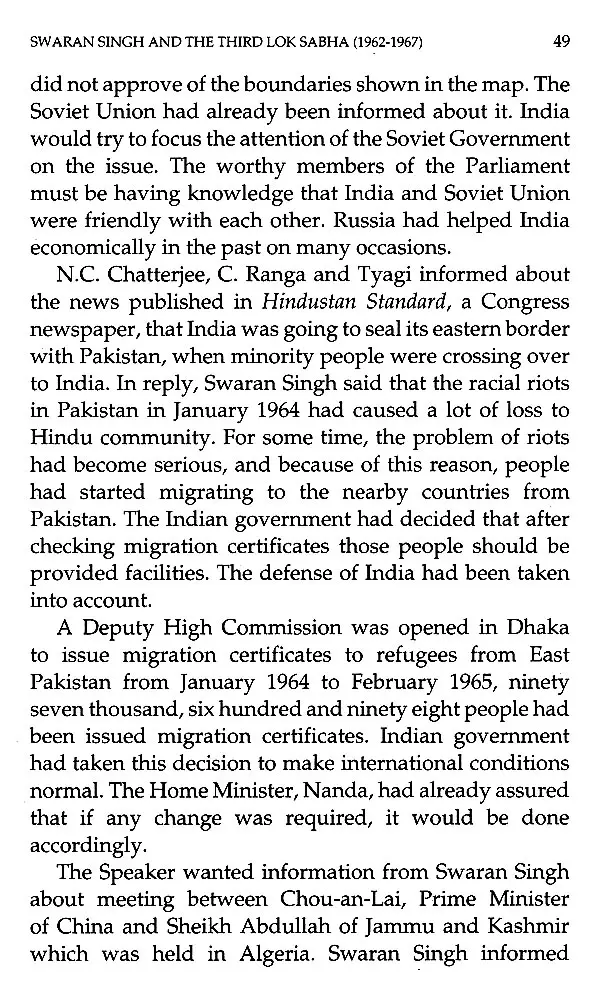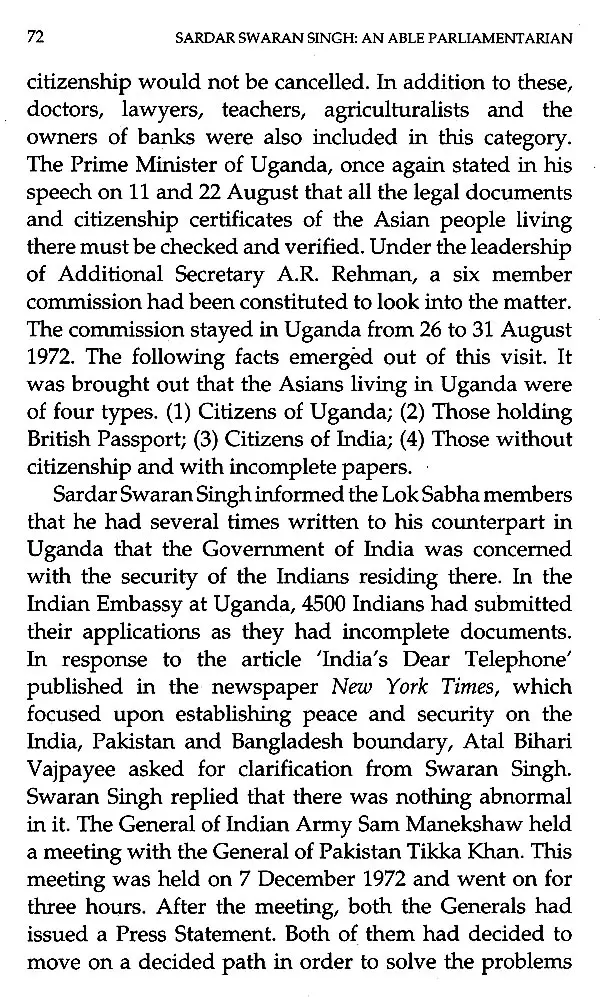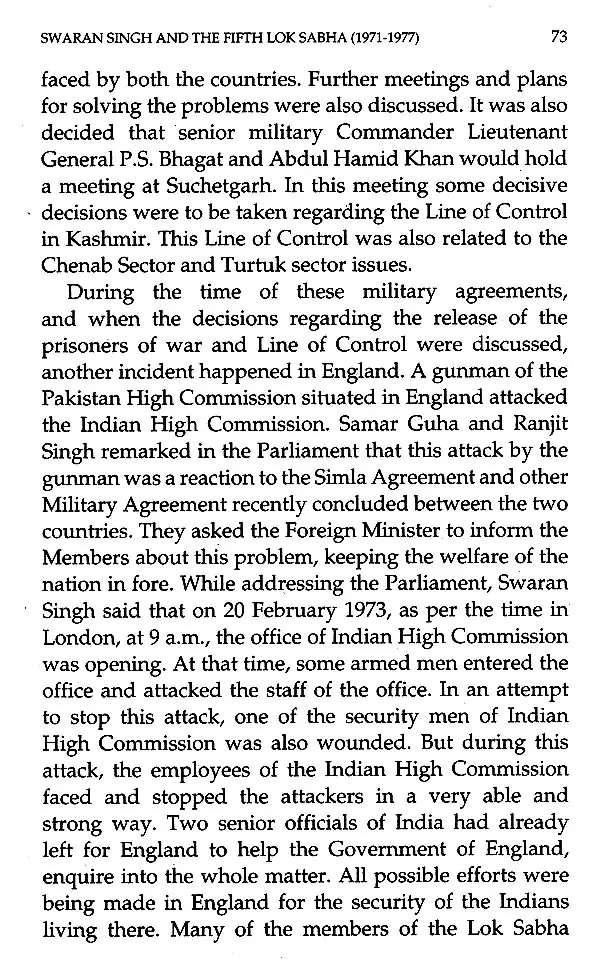
Sardar Swaran Singh - An Able Parliamentarian
Book Specification
| Item Code: | UAF335 |
| Author: | Mohammad Idris |
| Publisher: | National Book Trust, India |
| Language: | English |
| Edition: | 2016 |
| ISBN: | 9788123779775 |
| Pages: | 90 |
| Cover: | PAPERBACK |
| Other Details | 8.50 X 5.50 inch |
| Weight | 150 gm |
Book Description
Sardar Swaran Singh was an Indian parliamentarian. He is best known for his role as India's External Affairs minister and was also the President of the Indian National Congress in 1969 and 1978. A recipient of Padma Vibhushan, he is the longest-serving Union Cabinet minister in India. The present book gives an account of Sardar Swaran Singh's personal as well as political life and also highlights his thoughtful inputs on various important issues that were raised during the parliamentary sessions. In addition, the book also gives personal opinion of the people associated with him.
Mohammad Idris, recipient of Punjab State Award for Literature and Social Service 2010, is presently an Assistant Professor in the Department of History, Punjabi University, Patiala: He has authored books like Sheikh Farid Itihasik Paripekh; Mughal Bharat 1526-1707; Foreign Trade Under the Mughals and Bharti Dharam Darshan Ate Samajik Ekta de Itiasik Soomey. His research papers have been published in various journals of international repute like Berkley Journal of Social Sciences.
Sardar Swaran Singh was born on 19 August 1904 at Shankar village in Jalandhar District of Punjab. His father, Sardar Pratap Singh, was a prominent figure among the Sikhs and remained the Vice-President and the President of the Shiromani Gurudwara Prabandhak Committee, Amritsar, for a number of years. After the death of his father in 1946, Sardar Swaran Singh was elected to the Punjab State Legislative Assembly on the Panthic party's ticket. Swaran Singh played an outstanding role in Indian Political life (especially in International Affairs) for over three decades from 1946-1976. He joined the Cabinet headed by Jawaharlal Nehru in 1952 and remained a Minister continuously till he quits Indira Gandhi's Cabinet in 1975. As Independent India's longest serving Cabinet Minister, he held a variety of jobs, ranging from Railways, Agriculture, Mines, and Defence to Foreign Affairs. He had been a spokesman of the Government of India in various National and International forums.
The present book based on the life and works of Sardar Swaran Singh is an in-depth analysis carried out by the author based on the close readings of his speeches in the Lok Sabha and Rajya Sabha, besides, at various international organizations like United Nations Organization. This book is divided into two parts. The first part of the book is the outcome of Swaran Singh's political career, as a member of the Punjab State Legislative Assembly, Rajya Sabha and Lok Sabha. Whereas the second part of the book is based on the interviews of various eminent personalities associated with this Statesman from time to time.
The first chapter of the book presents the prevailing political scenario after India's Independence. The chapter Introduction' puts particular emphasis on the role of Sardar Swaran Singh in the Partition Council and as the Home Minister of the joint Punjab. The chapter highlights his meetings with Jawaharlal Nehru and other personalities like Chandu Lal Trivedi, Gopi Chand Bhargava and Lord Mountbatten.
In the Second chapter an attempt has been made to study the socio-political situation leading to his nomination to Rajya Sabha at that time. The chapter also lists the works of Swaran Singh as a Minister for Works, Housing & Supply with additional charge of Commerce. The chapter also throws light on his agreements with Pakistan on the issues of water and problems of the refugees.
Sardar Swaran Singh (1907-94) was a man of great caliber and ability who devoted his whole life to the service of the nation and the betterment of its citizens. He was a true parliamentarian, who upheld the traditional values, dignity and honour of the house for over twenty five years. His contribution towards nation building after independence is enormous. His role in the formation and implementation of the country's defence and foreign policies is unparalleled. Recognizing this, Dr Manmohan Singh, Former Prime Minister of India, unveiled his portrait in the central hall of the Parliament House on 22 December, 2008.
Sardar Swaran Singh's conduct was always dignified as he served the country with utmost dedication and commitment. Only national interests formed the basis for all his decisions and actions. He distinguished himself in all the positions he occupied, with his wisdom and sagacity. He had always shunned publicity and believed in working for the protection of the interests of the nation quietly.
After the Independence of India, leaders like Mahatma Gandhi, Jawaharlal Nehru, Maulana Abul Kalam Azad and Sardar Swaran Singh played a significant role. The present book highlights the achievements of Sardar Swaran Singh at various positions at state, country and international levels. The newspapers like The Dawn, Pakistan Times, The Hindustan Times, Partition Proceedings, Press Communiqué, Confidential Reports and International newspapers like The Independent, The Guardian, New York Times etc. have been critically analysed and useful information has been extracted to form this book.
Leaders are born not made' this is the most accepted notion about leadership. Those who support this opinion maintain that there are certain inborn qualities which enable a man to be a leader. Another belief is that leadership is a function of a group. According to this view, a leader occupies a special status in the group. He is considered to be the 'central figure' by all group members who find in him the qualities which can help the members of the group achieving desired goals. A leader as a planner decides the ways and means by which the group shall achieve its ends. As a policy maker, he formulates the goals and policies. It is not possible for all the members of a large group to deal directly with other groups and people outside the group. A leader assumes the role of a representative of the group. As a mediator, he calls for identification of the areas of agreement among the groups and brings togetherness through mutual understanding and consent.
The approach of the studies on leadership, so far being published, are often discussed and related mainly with the top leadership. The major studies available are devoted to the leaders having national or international repute such as Lenin, Martin Luther King, Stalin, Churchill, Roosevelt, Woodrow Wilson, Mahatma Gandhi, Jawaharlal Nehru and Mohammad Ali Jinnah. There are very few studies at other levels of leadership, such as at party level and intermediate levels in government and in political parties. Studies of leadership at these levels have been more or less ignored by scholars. Sardar Swaran Singh who remained a cabinet minister in India for a quarter of a century was one such leader. He was one of the greatest sons of India who played an important role in shaping its destiny during the twentieth century.
**Contents and Sample Pages**
